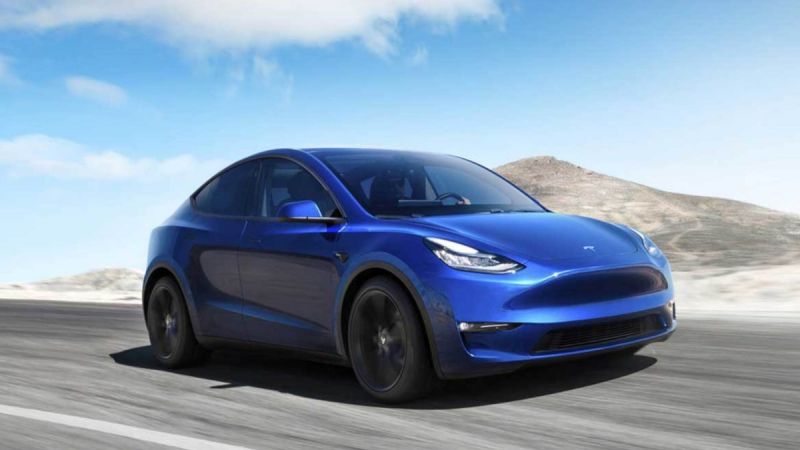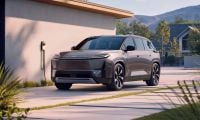As another quarter draws to a close, all eyes are once again on Tesla sales. As bears and bulls alike try to pick the bones out of the company’s latest financials, will it be another record quarter or could waning demand for Tesla’s high-end models remain a drag factor?
As for General Motors, unless anything remarkable occurs, the automaker’s electric sales will simply be recorded alongside those of their non-Tesla competitors and the media will move on. Very few headlines, very little fanfare.
That’s because the Chevy Bolt EV has sold steadily, if unspectacularly, over its three years on the market. Sales rarely exceed the low thousands every month, but the car remains competitive in its class even as prices fluctuate, new models emerge, and incentives phase out.
Against that backdrop, how will the 2020 Chevy Bolt EV fare when it has to go head-to-head with the Tesla Model Y next year?
Watch the video below to see how EV sales have changed over the last decade. (Please subscribe to Torque News Youtube Channel for daily automotive news and analysis).
Tesla Model Y is a More Direct Competitor for the Chevy Bolt EV
Any comparison of the two first affordable long-range electric vehicles, the 2017 Chevy Bolt EV and Tesla Model 3, is complicated by several factors.
In addition to the Bolt EV being available for more than a year longer than the Model 3, the latter is also a different style of vehicle that is competing on many different fronts. Yes, it has a version that starts at a similar base price to the Bolt EV and the two match each other’s range at that level, but the cars head in different directions from there.
The Model 3 competes more directly with the likes of performance sedans from Audi and BMW, while the Chevy Bolt EV goes up against more compact cars like the Nissan Leaf and, more recently, the Kia Niro EV and Hyundai Kona Electric. The issue is that many of the Bolt EV’s competitors are unavailable in some areas, restricted either by limited production or a focus on selling only in EV-friendly ZEV states.
For context, here are a few ways the Chevy Bolt EV is already outdated, as well as some suggestions for improvements that GM can make.
That makes the Tesla Model Y, assuming it arrives as scheduled late next year, the most likely competitor to the 2020 Chevy Bolt EV in terms of availability and anticipated base price.
Let’s look at some of the reasons Bolt EV owners might be persuaded to make the switch.
1. Similar Form Factor
For many Chevy Bolt EV owners I hear from, the reason offered for passing on a Tesla Model 3 now that they’re readily available is simple: the Model 3 doesn’t have a hatch. Although it might sound trivial, hatchback design makes a car much more practical.
The Model 3 has a similar capacity to the Bolt EV, but it’s not as flexible. The 16.9 ft³ offered by the Bolt is not only larger than the Model 3’s 15 ft³ but also more accessible. The Bolt might look small on the outside, but it’s deceptively large on the inside. That hatch will swallow boxes, bikes, or even a full IKEA run when you fold the rear seats down.
The Tesla Model Y could solve this common complaint.
Offering the same improved ride height and luggage capacity that distinguishes the Chevy Bolt EV from the Model 3, the Model Y will also bring all the features, performance and range benefits that attract people to Tesla in the first place.
Watch the Plug & Play EV channel summary of why we might choose to switch from Bolt EV to Tesla Model Y in 2020.
2. Lots of Bolt EVs Are Off-Lease in 2020
The Tesla Model Y will be tantalizingly close to production as many early Bolt EV drivers come to the end of their three-year leases next year. Admittedly, Tesla will probably sell the high-end options first, which will run $50k or more and price out many Bolt EV owners.
Even so, there could be enough motivation to find ways to bridge the gap between the end of a Bolt EV lease and mass production of the Model Y.
For example, Tesla learned a lot with the Model 3’s “production hell” phase last year, so it’s reasonable to assume that more affordable versions of the Model Y will follow quickly after the long-range performance versions.
It’s a big ask for a company with a track record of missing deadlines, but perhaps this time Tesla can get the Model Y out on time to give guaranteed delivery dates. Better yet, if the company can move production runs forward by a quarter to summer/fall 2020, Tesla will be in pole position to scoop up a healthy number of former Bolt EV drivers.
3. The Used Bolt EV Market Will Be Buzzing
As with the previous point, this one depends on how many 2017 Chevy Bolt EVs are returned when they come off lease next year. The used market for the Bolt EV could be buzzing, making it harder to get buyers into the 2020 model unless it has some significant upgrades (more on that next).
By contrast, Tesla has no comparable used market in this vehicle category.
The Tesla Model X brings the SUV form factor, but its price point is more than double what the Model Y and Bolt EV will be. With is complex gullwing doors, the Model X also caters to a very specific segment of tech-forward early adopters.
With that in mind and no real used market to dilute its sales, the Tesla Model Y will be a more distinct offering for buyers willing to stretch their budget to get into a Tesla.
Here's why Torque News writer John Goreham recommends you act fast if you want a new Tesla.
4. Potential Lack of EV Urgency from GM
In the end, much could depend on just how aggressive GM chooses to be in pursuing the company’s plans for electrification.
On the one hand, GM could continue its trend of recent years and leave the 2020 Chevy Bolt EV largely unchanged. If so, it will certainly struggle to compete with the Tesla Model Y and, indeed, any other comparable EV from legacy automakers.
Along with the Kia Niro EV and Hyundai Kona Electric, the 2020 Kia Soul EV and even the Volkswagen ID. Crozz could be available by late next year. Without a mid-cycle refresh, an unchanged Bolt EV will continue to look outdated in that field.
On the other hand, GM could surprise us all. It could provide not just forward-thinking changes for the latest Bolt EV, but might also announce brand new models that liven up the market.
GM has plans for 20 new electric models across all of its brands by 2023 and it has to start somewhere. Getting a jump on the competition next year would give existing Chevy Bolt EV owners confidence that the company is committed to electric vehicles and worth sticking with over the long term.
Should GM show a lack of urgency with its EV program, however, there’s one automaker ready to scoop up market share in every category.
The Tesla Model Y is positioned as the car that brings EVs to the masses. It is particularly suitable for families and buyers who value practicality over performance, but who certainly wouldn’t argue if both are on offer. If the Model Y can deliver on its promises and legacy automakers like GM fail to provide a compelling alternative, Tesla will eat their lunch in this vehicle segment as well.
This is a lot of speculation, of course, and the EV sector moves so quickly that any number of factors could change the picture between now and summer 2020.
What we can say for sure is that the options for anyone considering an electric vehicle are becoming broader and more compelling with every passing year, which can only be a good thing for EV adoption.
If you're currently driving a leased Chevy Bolt EV, what are your plans for the end of your lease?
Would you consider another manufacturer for your next EV or do you trust GM to deliver on their plans for electrification?
Let us know in the comments!
Watch Video Report of 4 Reasons Why Bolt EV Owners May Convert To Tesla Model Y and Click to Subscribe to Torque News Youtube For Daily Tesla and Automotive News Analysis.
See you in the next story titled: New Report Highlights Tesla Model 3 and Honda Clarity PHEV for Increased EV Adoption.
Steve Birkett is an electric vehicle advocate at Plug & Play EV. You can follow him on Twitter at @Plugandplayev, Instagram and Youtube at Plugandplayev Channel to send him EV news tips.
Set as google preferred source












Comments
Steve we are considering the
Permalink
Steve we are considering the Tesla Model Y when our Bolt lease is up. The Short range won't be available at first so we may be down to a one car family while we wait. Why the Y? Adaptive Cruise Control. There is of course the better and faster charging infrastructure but we will probably use the Y around town only, thus the short range version. There is nothing as stress relieving as autopilot in stop and go traffic, of which we have plenty. The extra cargo space behind an automatic liftgate will be a plus. We'll miss the surround view and the rearview wide angle camera and the true one pedal driving of the Bolt.
Very well balanced
Permalink
In reply to Steve we are considering the by Harvey (not verified)
Very well balanced perspective Harvey, thanks for sharing your thoughts.
We are in the same boat. We
Permalink
In reply to Steve we are considering the by Harvey (not verified)
We are in the same boat. We have a Bolt and lease is up October 2020. We also have a leased Kia Sedona minivan that we take all of our trips in because it holds 7 and that lease is up next March 2020. So we either stop taking trips for a year or 2 but the other problem is we take our friends 2 kids to school as well so when school starts back up in August here in California we need the seats! So it's going to be interesting to see how we fill that gap for at least 4-6 months and possibly more if the 7 seater is more delayed in 2021! Reach out to me if you want at [email protected] if you want to discuss ideas or what I chose to do etc...
Thanks for the offer, I'll
Permalink
In reply to We are in the same boat. We by Mike (not verified)
Thanks for the offer, I'll certainly be in touch! Like most observers, I was surprised to see the option for extra seats at the Model Y unveil. I'm not convinced there will be much room back there though, but it might be fine for smaller humans. Here's hoping.
Without a complete 180 on
Permalink
Without a complete 180 on Tesla's position on unions and Right to Repair, they can park that Model Y where the sun don't shine.
Something I need to read up
Permalink
In reply to Without a complete 180 on by Brian (not verified)
Something I need to read up on in more depth, it would seem. Thanks for sharing your opinion.
Probably not. It does not
Permalink
Probably not. It does not look like the Y has as much large item storage capacity as the Bolt. I want to see how the Bolt EUV turns out.
So much does depend on how
Permalink
In reply to Probably not. It does not by John (not verified)
So much does depend on how quickly GM accelerates these new models, starting with the Bolt EUV (if it's a thing... I know they trademarked it but I can't see them lining a Bolt EV alongside a Bolt EUV without expecting endless questions). If there's nothing new for 2020, it feels like they'll "pull a Nissan" and let a small but dedicated base of EV buyers slip away to the competition.
I wish I could participate in
Permalink
I wish I could participate in a serious discussion, but sadly my aversion to the aesthetics of the Model Y (or as I call it, either the “Model Why?” Or “Model 3 hatchback”) is so strong that I am unable to maintain neutrality in my examination of if. That said I do think that it won’t be that much more of a draw to current Bolt EV owners then the Model 3 was. Thus I bet there will be a lower conversion rate then the 3 had since many of those that would of switched to the Y probably already switched to the 3.
If Tesla Model Y really
Permalink
If Tesla Model Y really offers at least 6 usable seats that would do it for me if the price is reasonable. And if Tesla is still around by then in the first place.
Looking at the early models,
Permalink
In reply to If Tesla Model Y really by Matthias (not verified)
Looking at the early models, it looks like anything more than 5 will be a squeeze. I can't see the base price being much below $42-43K when all's said and done (feature additions, range options, etc.), so it could be a stretch for many of us coming from a Bolt EV.
The growing understanding
Permalink
The growing understanding that GM is light years behind on electronics would make the Model Y a much better CUV choice
Not sure I follow your
Permalink
In reply to The growing understanding by Thomas (not verified)
Not sure I follow your comment... electronics as in the computer system or do you mean GM's broader electric vehicle platform? Either way, I don't disagree that the Model Y will be a better CUV. It will also be $10-15K more expensive, of course.
I would use the Tesla Model Y
Permalink
I would use the Tesla Model Y for a more comfortable long distance trips without having to worry where to charge it! All the other electric cars are simply unreliable as they don't have access to the network of Tesla Supercharging stations. There is simply not enough publicly available fast charging stations for the rest of the EV's and Tesla can use those as well. This is the prime reason why we would go with a Tesla and not anything else.
I think the cars are
Permalink
In reply to I would use the Tesla Model Y by Joe Real (not verified)
I think the cars are perfectly reliable, it's just that the Supercharger network sets a gold standard for the fast charging experience. Without vertical integration, i.e. running their own charging networks or being very closely involved with one, other automakers are reliant on a third-party for an important part of the ownership experience. Tesla doesn't have that problem and it shows.
To illustrate how far EV's
Permalink
To illustrate how far EV's have to go before they become mainstream, it has been reported that GM loses $9K on every Bolt it makes.
I think they corrected that
Permalink
In reply to To illustrate how far EV's by gery katona (not verified)
I think they corrected that figure in more recent reporting, but it's definitely not a model that's making them money in its current form. More a proof of concept right now, tracking the performance of the (very efficient) BEV2 platform and giving a launch pad for autonomous vehicle testing, rideshare, and car share programs.
Mass production will bring the profits with economies of scale. It's amazing how much production costs can be trimmed when a manufacturer actually wants to make and sell the vehicle!
GM has only themselves and
Permalink
In reply to To illustrate how far EV's by gery katona (not verified)
GM has only themselves and specifically Mary Barra to blame for their total lack of vision as a car manufacturer. They have a fleet of dinosaurs and make no effort to at least upgrade to the mammal category. The Bolt is a great car that could continue to evolve to greater heights, if only GM made an effort to market them and to accelerate their EV department. My god - who the hell cares about mediocre cars like Equinox or Cruze - complete and utter mediocrity.
Yes, Steve, Tesla owns the
Permalink
Yes, Steve, Tesla owns the gold standard in charging stations. All others pail in comparison. But I have a suggestion, would it not be wonderful if "Pilot, Flying J, and Loves" gas stations, mostly located along the internet system and easy to find had fast DC chargers available! Let the local electric utility companies deliver the power which would allow EV customers to be billed by the power (watts) used. This would eliminate awkward 'time' (minutes) charges and the search for existing but mostly inconveniently located charge stops. I see it as a win, win for the EV owner, the gas station and the power company.
How can you write an article
Permalink
How can you write an article like that and not mention price? I got my Bolt insanely cheap at a price Tesla can't get close to. So far, doing just fine recharging from a 110v at home. :)